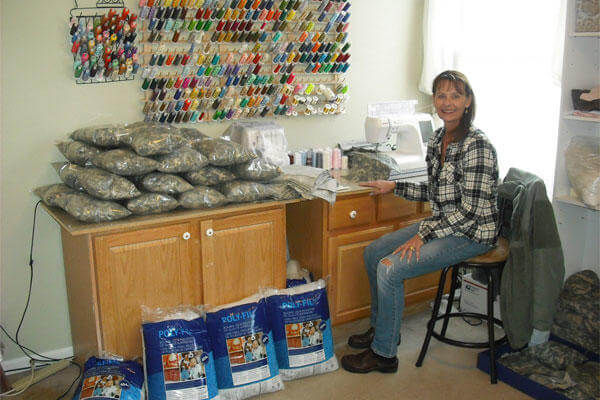We've heard it from hundreds of spouses: You've got a knack for craft you just can't shake. Everyone knows you're brilliant at it and friends and family pester you to help all the time - with those too-cute birthday party invitations, homemade blankets, deployment memorabilia, perfect, personalized art for your walls.
You've clearly got the talent, but how do you move from creative friend to creative business person?
Step one: Start Charging
"That's the part I'm really scared of," says Natalee, a Navy wife who has been toying around with the idea of launching an Etsy store. "I make nice drawings for babies and nurseries that my friends always ask for and hang. Little Soldiers and Sailors. They're really popular at showers. I'm worried that if I try to sell them, no one will want them and it won't work out. Maybe people only want them because they're free."
Natalee's concerns made sense to Gaby, an Army wife and the artistic brains behind Homefront Girl, which makes military-themed home decor, fabric, and paper goods now sold at major retailers nationwide. (Check out her awesome "love my hero" fabric on sale at JoAnn!)
"I certainly can relate because I was caught in that dilemma many times over the years," Gaby explains. "As Military spouses, "volunteer" and "freelancing" are kind of second nature to us. We are an incredibly giving community." But getting started in the creative business side of things means going a step above and beyond what you've been doing for friends - now, in addition to making great product, you have to make great product that someone will actually pay for.
But charging for your work can do more than line your pockets and launch your business. It can actually help fuel your sense of passion and determination about your product. "For me as a designer," Gaby says, "I found it very helpful when I started charging for my work and skills early on. Most of all realize that to take your business to the next level you have to learn to stand up for it to the world." If, like Natalee, adding a price tag to your work makes you nervous, keep Gaby's advice in mind. Not only is it the first step towards a creative business, it's also a powerful way to legitimize all the hard work you've been doing. Yes, it IS worth that much!
Once you've set a value for your work, the next step is making sure your product is ready to enter the market - and that it is unique enough to survive.
Step Two: Market Research. Are you unique enough?
"I would recommend to anyone starting their business, be it an Etsy shop or other to take stock of what you are creating, do some research on similar products and what they sell for," encourages Gaby. Knowing what's out there will help you figure out your place in the market - what the right price range is to sell your goods to customers, and how to ensure that they are special and stand out.
Laura is a pilot's wife and I Heart Fly Boys Etsy shop owner who agrees that being unique is the key to success in the creative field. "A piece of advice I would give to milspouses who also are trying to start up an Etsy or crafting business is be unique. By be unique, I mean find a niche- take notice of any void in the market (whatever market you'll be trying to break into). I found that a lot of people have PCS signs and family establishment signs, but I wanted to be different. Nothing against those, I've made a lot myself, but I wanted to branch out and not be too kitschy."
By making sure that she made something completely unique, Laura was able to capture a corner of the market no one else yet dominated. You may be toying in places where there are a lot of sales already (like she did with PCS and family establishment signs), so put that creative energy to use and find a way to make your product fresh and special.
Step Three: Expand Your Market
Once you have established that your product is unique (or modified it so that it is!), it's time to start building your audience. To get the word out about your business, you might want to consider selling your goods at community-level yard sales, craft sales, or holiday markets like those sponsored by churches and bases.
"Having some art background, I started dabbling by painting signs and shoes after our last move," Laura tells us. "What started as me just making things for my home and for close friends, turned into a small start-up business that spread through word of mouth around our local community." Talk to your friends and ask how they can help spread the word about your work. And remember that every piece of work you've given away or sold thus far is an advertisement for your business, and thanks to the military move schedule, those advertisements can circle the globe before you know it.
Word of mouth worked particularly well for Laura. "By the time my Etsy site opened, I had expanded my market to a larger military community," she says. "Within a year to a year and half, I was receiving international and APO orders and tripling my sales."
Natalee, our burgeoning creative, had thought about selling her wares at her church's holiday market, but she admits that nerves kept her from making the leap. "What if they all laughed or just bought it to be nice? I was too nervous." And that's the final key to success in any business, but especially a creative one. "It wasn't like this would be a regular failure. This would be my heart on the line. I just didn't want to be crushed."
Step Four: Take a Big Breath - And Believe In Yourself
Laura knows just how Natalee feels. "But if you really believe in your product and those who have been introduced to it believe in it too, then there's bound to be more potential there," she urges. "So stay with it!"
No matter your medium, getting started is always the hardest part. But the beauty of a creative job is that you can take it at your own speed. You can spend a week or several years learning your market, pinpointing your audience, and developing your product. Do it on your schedule. You can add items one at a time to your Etsy shop until you're ready to launch it. The beauty of a creative career is that it's one you determine the speed of - and in the military community, that's a great job perk.
"The great thing about Etsy is it gives you the freedom to take your business anywhere and everywhere," says Laura. "You can PCS and move across the world and still stay creative and sell your work." So as you start on your path to the creative career, just remember: Both Laura and Gaby started small. An Etsy shop can be however large or small you'd like, and it's always possible that, like Gaby, one day your wares will be sold at major chains nationwide. They got where they are because they believed in themselves and started small - and you can too.
Looking for more advice on making the leap from creative to creative business? Gaby recommends that you read "The Graphic Artists Guild Handbook: Pricing & Ethical Guidelines."
If you've been considering a creative career or have already started one, let us know. We're always eager to hear from military spouses who have been there, done that, and can help others get started on the path to success, too!




